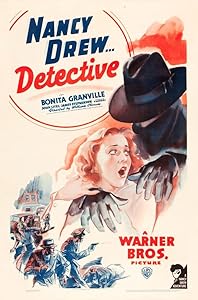Doris Force, a sixteen-year-old girl, loves singing, hanging out with her friends and boyfriend, and being doted upon by her indulgent uncle. Her carefree summer is interrupted by a mysterious letter penned by the Misses Gates, distant relatives. They beseech her to come to their mansion, Locked Gates, for a few weeks for a visit.
Doris, uncommonly excited by the invitation, begs her uncle to go to Locked Gates. He is suspicious as to why they are contacting her now without ever trying to be in her life before. Doris is convinced that the two sisters have no malice and are looking for someone to bestow an inheritance on when they pass on.
Doris decides to go to Locked Gates with her best friend, Kitty, for a few weeks. Their initial reception at the old, remote house is mixed. The Misses Gates are delighted to entertain the young girls and hear their chattering. However, they are treated with hostility by the two servants, a married couple named Cora and Henry who look after the sisters.
Also visiting the sisters is Ronald Trent, an oily young man who is the son of their past lover, John Trent. Ronald, who is handling an inheritance for the sisters, appears to be swindling them out of money to pay for lawyers.
One night, Doris overhears Ronald Trent and Henry making sinister-sounding plans to pull a scam on the two elderly ladies before they all skip town. She runs back to her room and, together with Kitty, tries to unmask the three villains.
Pressure is put on Doris to uncover what is really happening at Locked Gates when the two sisters reveal that they have invited her to ask her for a loan of $500 since she has a sizeable fortune left from her dead parents. She is loathe to refuse them, but they insist the loan must be handed to Ronald. The money will be used to handle more fees incurred while trying to procure their inheritance.
Doris and Kitty know they shouldn’t give the money to Ronald and try to forestall giving him any money until they can figure out his scam. However, they have no real ideas about what to do. Every night they stay in the house, they hear weird sounds coming from the house, and Cora and Henry are becoming increasingly hostile to the teens.
Finally, the two sisters, Cora and Henry, are out of the house, and the two girls steal away to snoop in Cora and Henry’s quarters to search for clues. They are shocked to findthat hidden in their room is a malnourished and uneducated young woman who is Cora and Henry’s daughter. She is crippled and has been badly neglected. They try to befriend her but soon hear Cora and Henry approaching. While hiding, Doris and Kitty frantically hide in the closet and finally hear the final pieces of Cora, Henry, and Ronald’s dastardly scheme.
Now Doris and Kitty must save themselves from significant harm, somehow reveal the dastardly financial plot against the Misses Gates, and help Etta, the poor abused daughter of Cora and Henry, before it’s too late.
The Review
Doris Force is an unusual protagonist compared to Mildred A. Wirt’s other creations, Nancy Drew and Penny Parker, because she is a regular teenager who is not interested in mysteries or sleuthing and finds the strength in herself and her friends to stop this plot.
It’s really great to see an indulged, slightly greedy, and vain young woman learn the value of money and realize her position of privilege. Then, she makes the leap that this position of privilege obligates her to help the unworldly Miss Gates and the abused Etta. At the end of the book, she is rewarded but splits the reward and isn’t motivated to help the people she sees being taken advantage of because of the reward.
I enjoyed watching Doris’ character growth during her first book. I really liked that at the end of her first adventure, she is still committed to her career goal of being an opera singer and not a detective or journalist.
What is also interesting about Doris’s first book is that one of the central mysteries—what happened to John Trent and whether he actually had a son named Ronald—is left unsolved and explicitly stated as the central theme in the next book. Intentional serialization is rare in these usually episodic stories, which are easier to market to young readers.
Doris’s less virtuous personality and unusual career choices are excellent riffs on girls’ detective stories’ tired, formulaic natures. The book is more focused on exploring relationships than clueing mysteries, which allows the story to breathe a bit, with more characterization, plot, and settings.
However, more time spent with the characters means that several of Wirt’s less desirable themes are more prevalent. Wirt’s obsession with looks, especially fatphobia, is on full display with her depiction of Marshall Mallow, nicknamed “Marshmallow,” whose weight is mentioned continuously in the narration or by his friends. Everyone is pretty obsessed with how this kid looks, and his friends “good-naturedly” tease him constantly about how much he eats.
When Kitty expresses romantic interest in Marshall, Doris is flabbergasted that someone could be attracted to him because he is “fat.” Having more grace than me, Kitty gently chides Doris and ignores her teasing. I thought that it would be a teaching moment, but no…Doris makes sure to have the same conversation with Kitty at least two more times.
Along with the fatphobia, Kitty and Doris have a lot of discussions about why Ronald is coarse and common based on his clothes, car, and where he spends his time. For Wirt, these are paramount class indicators and are heavily used to cast Ronald as sinister and gauche. It takes a long time for her to move away from these superficial ways of signaling Ronald’s badness to have the girls actually talk about his rude way of dealing with Misses Gates and his evil plan.
Doris and Kitty know Intuit from the beginning the object of his plan and soon stumble upon all of the participants, so they mystery is more about whether they can stop them from getting away with their fraud, help the Misses Gates recover their stolen money, and provide aid for Etta, which is again a bit of a twist on the genre.
I appreciate what Wirt is trying to do under the Julia K. Duncan nom de plume and wonder what other new ideas she will bring to a somewhat formulaic genre. Doris is not my favorite protagonist, but she is capable of growth in kindness, courage, and empathy. While she still has her foibles, I wonder where she will go in her next mystery. I’m also curious about the fate of John Trent, enough was set up in this book to have me invested to read the next book where his fate is revealed.
Doris Force at Locked Gates is a more experimental book in the girl detective genre. It breathes some life into it by breaking many of the known tropes. I think it will appeal to fans of the genre, but it is still peppered with many of Wirt’s biases, which are based on the prejudices of the 1930s.
None of this is more apparent than in the subplot surrounding the crippled girl, Etta. Doris and Kitty want to help Etta but soon realize they are wholly unequipped to deal with a situation of abuse and neglect of this magnitude. Etta is treated as a pet, more than a human. Mainly because that is how Etta is written; she believes Doris and Kitty are angels because the only human interaction is the Misses Gates reading her the bible every day. Etta has never seen another child and doesn’t even know the word “girl.”
I applaud Wirt for attempting to discuss and include a handicapped character in her book, but the reader can see at once that Wirt is unsure of what to do with Etta or even how to humanize Etta. Etta is included in the story to teach Doris that she has a lot of privilege and love in her life- which is not really why I want handicapped characters in books.
Etta has the mind of a young child, and although Doris and Kitty initially attempt to befriend Etta, they realize it’s impossible. Etta barely speaks and mostly just cries and frets and whimpers, putting her on the plane of a pet, not an abused ally. In the end, the Misses Gates decides to rehome Etta in a sanitorium, and we, the readers, are supposed to applaud their kindness while forgetting that they have been turning a blind eye to her systematic abuse for twenty years.
Yikes.
I am deeply ambivalent about this book. Although it is not appropriate for children, I still appreciate the changes Wirt is trying to make to the girl detective genre. Change is not linear, which is no more apparent than in Doris Force at Locked Gates.
Two steps forward, one step back.
However, I hope the kinks can be smoothed in the next installment.
Have you read any of the Doris Force series? Let me know what you think of them in the comments below.

Julia K. Duncan a.k.a. Mildred A. Wirt Biography
Mildred Augustine Wirt Benson (July 10, 1905 – May 28, 2002) was an American journalist and author, best known for her work as a ghostwriter for the Nancy Drew series under the pseudonym Carolyn Keene. Her life was marked by a remarkable career in journalism, adventure, and literary contributions.
Born in Ladora, Iowa, Mildred showed a talent for writing from a young age. She attended the University of Iowa, where she earned her bachelor’s degree in English and a master’s degree in journalism. During her time at university, she was involved in various writing endeavors, including working for the campus newspaper and literary magazine.
In 1926, at the age of 21, she began working for the Stratemeyer Syndicate, a company known for producing popular series books aimed at young readers. It was here that she began her most famous work as the original ghostwriter for the Nancy Drew mystery series. She penned the first three books of the series and contributed to many more under the pseudonym Carolyn Keene.
Beyond her work with Nancy Drew, Mildred was an accomplished journalist, writing for various newspapers including the Toledo Times and the Toledo Blade. She also became a pilot, and her adventurous spirit led her to travel extensively.
In addition to her journalism and Nancy Drew contributions, Mildred wrote many other books and stories, including her own series featuring the adventurous Penny Parker. She was an inspiration to many aspiring writers, especially women, breaking barriers in both journalism and children’s literature.
Mildred Augustine Wirt Benson’s legacy continues to inspire writers and readers alike, and her impact on children’s literature, particularly through her work on Nancy Drew, remains significant.





Leave a comment